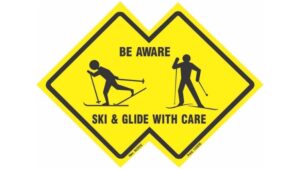In 2022, more than 66,000 injuries resulting in emergency department visits were attributed to skiing and snowboarding. According to the National Ski Areas Association, there were 46 skier and snowboarder fatalities and 53 catastrophic injuries in the 2022-2023 ski season. Most of these fatalities and injuries were caused by speed, loss of control, and collisions.
What Safety Practices Should Be Followed When Skiing?
The National Ski Areas Association created the “Your Responsibility Code” in 1962, which is made up of 10 safety practices to follow: 
- Always stay in control. You must be able to stop or avoid people or objects.
- People ahead or downhill of you have the right-of-way. You must avoid them.
- Stop only where you are visible from above and do not restrict traffic.
- Look uphill and avoid others before starting downhill or entering a trail.
- You must prevent runaway equipment.
- Read and obey all signs, warnings, and hazard markings.
- Keep off closed trails and out of closed areas.
- You must know how and be able to load, ride and unload lifts safely. If you need assistance, ask the lift attendant.
- Do not use lifts or terrain when impaired by alcohol or drugs.
- If you are involved in a collision or incident, share your contact information with each other and a ski area employee.
The United States Forest Service also recommends the following equipment be used:
- Helmet designed for skiing and snowboarding
- Goggles that fit over a helmet
- Properly fitted boots and bindings
- Sunscreen
- Wrist guards for snowboarders
What is your duty as a skier?
According to Massachusetts law, a downhill skier has a duty to avoid a collision with any other skier, person, or object below. A skier is solely responsible for any collisions with another person or obstruction, so long as the obstruction was properly marked pursuant to regulations. Massachusetts law provides that a skier is presumed to know their ability to ski on any slope, trail, or area. A skier is also presumed to know the existence of unavoidable risks inherent to skiing. Unavoidable risks include variations in terrain, and surface, subsurface and ice conditions. A skier assumes the risk of injury or loss caused by these inherent risks.
How do I notify a ski area operator if I am injured and wish to recover?
Under Massachusetts General Law, a skier must give notice to a ski area operator within 90 days of the incident by registered mail. Notice should include the name and address of the injured person, and the time, place, and cause of the injury. Any action to recover for your injury must be brought within one year of the date you were injured. SUGARMAN has a team of dedicated personal injury attorneys who represent those who have been injured. If you have been hurt in an accident and wish to speak to one of our attorneys regarding liability, please fill out a Contact Form, call us at (617) 542-1000, or e-mail .
